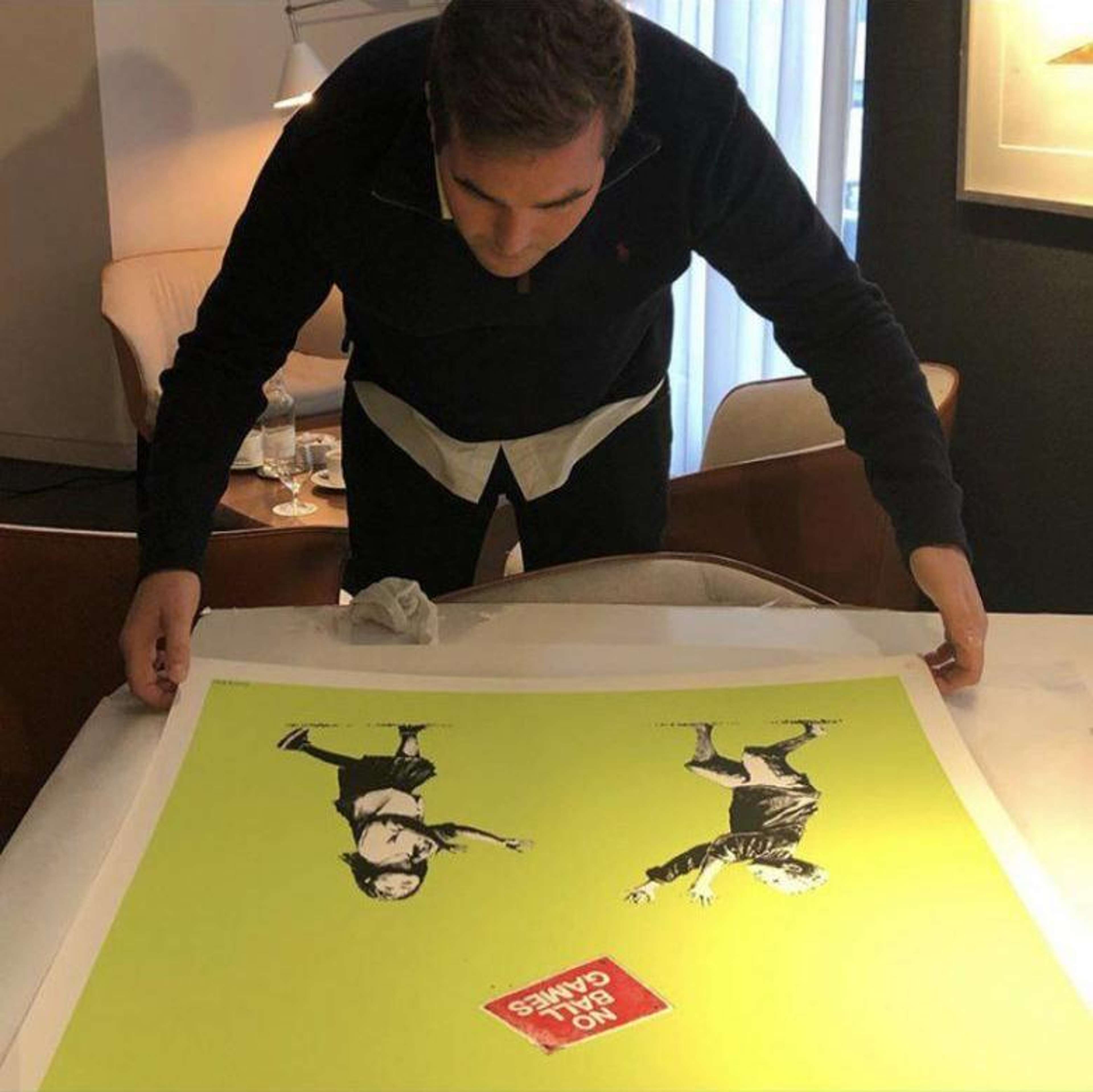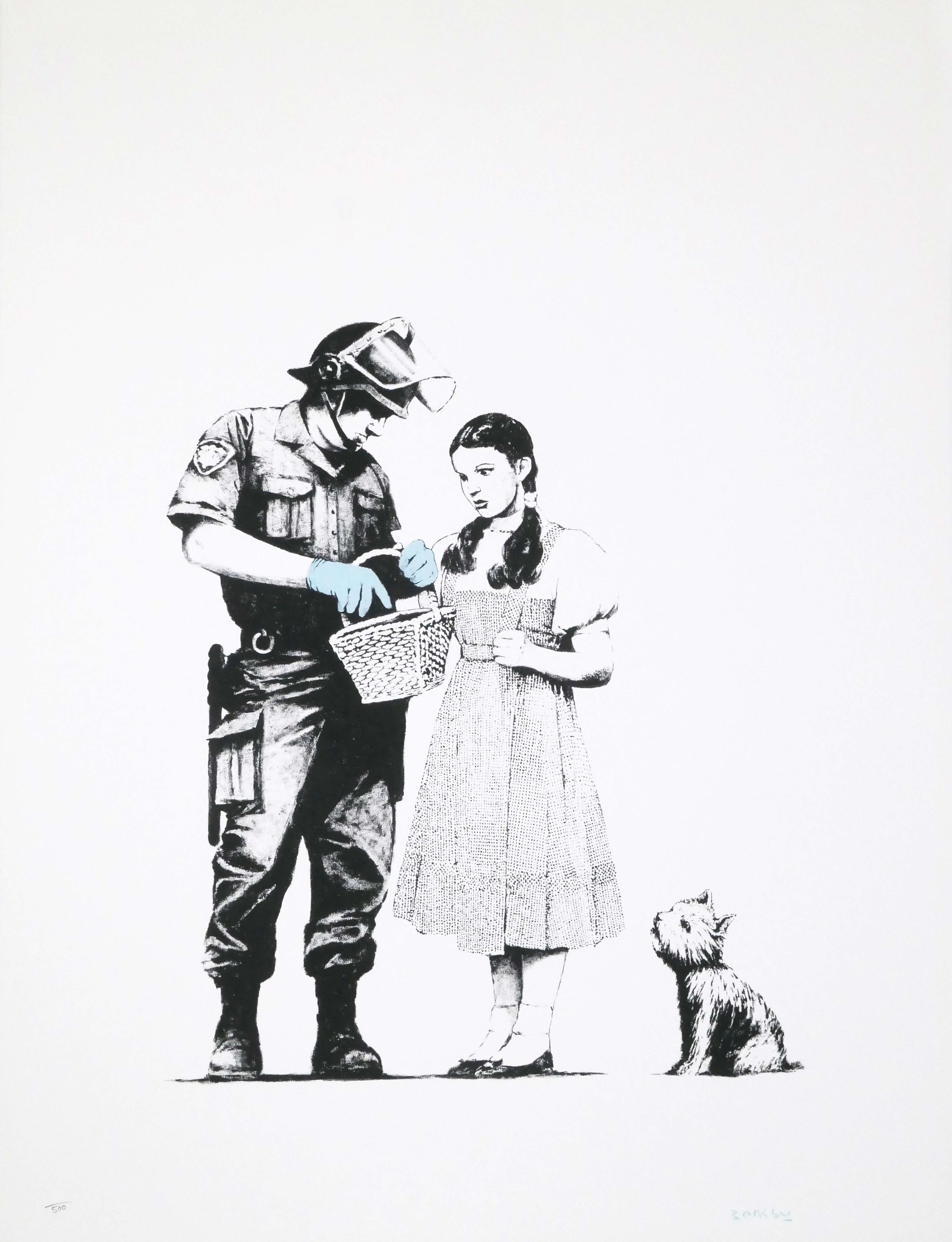Storage, Display and Restoration: Caring for your Banksy Print

 No Ball Games (green) by Banksy © MyArtBroker
No Ball Games (green) by Banksy © MyArtBroker
Banksy
270 works
Key Takeaways
While a Banksy print requires considerably less protection and conservation than a painting by an Old Master, there are still many important factors to consider when buying, framing and hanging an artwork by the street artist. Here we caught up with our recommended conservators, Fine Art Restoration Company, to get some expert tips on collecting and caring for your Banksy collection.
What should collectors look out for before buying a Banksy print?
Before buying a Banksy print,there are certain things you can do to ensure the work you are investing in is in good condition. Always examine the front and back – we would recommend viewing the artwork in normal, raking and transmitted light wherever possible. Collectors should also seek to view the work unframed if possible as artwork edges – which are often concealed by a window-mount or frame – can reveal a lot about the artwork's condition. When considering an artwork's condition, a collector should look out for planar distortions, stains, tears, bits of tape, uneven paper tone, discolouration, creases, cracked or flaking media, and scratches. It is also worth bearing in mind that spray paint editions may be more vulnerable in the long term, as they tend to be executed on less stable materials than the screen prints.
How can a condition report help?
To the untrained eye a print might not look damaged at all, and this is where a condition report comes in handy. A condition report should be produced by a conservator who is trained both to recognise, and also to interpret potential issues. It highlights, describes and discusses all of the issues mentioned above. It may also include potential treatment and future care guidance and provides a reference against which future changes can be monitored. If you are still unsure, we recommend having the work examined unframed by a conservator prior to purchase, this would enable assessment of the artwork condition, its frame and framing materials, and appropriate recommendations for future display.
Why is it important to conserve or restore your Banksy print?
As well as guarding your investment, good conservation practice ensures an artwork can be enjoyed by generations to come. Artworks are complex objects which carry aesthetic, political and social significance – to preserve them allows future generations to connect to the artists and people who came before them. While it might make headlines, and a new artwork, when Banksy shreds one of his own prints, doing so yourself does not!
While not-shredding your print is a fairly straightforward imperative, the broader world of conservation and art print restoration may seem overwhelming at first. Help is always at hand. A collector should seek the advice of conservators, reputable art professionals, and reputable framers when considering how best to care for, house and display artwork. It is also important to remember that some deterioration is inevitable and that this is part of the inherent conflict between the preservation of art on paper and its exposure to light and environmental conditions during display. Art is made to be seen and so a compromise will always need to be made between the display of an artwork and its preservation.
What factors are involved in displaying a Banksy print at home?
You might have found the perfect spot on the wall for that Girl With Balloon or Love Rat but have you considered how the sun hits it, or how seasonal changes will affect the paper? Works on paper should be displayed away from sources of light, heat, high and fluctuating humidity. Kitchens, bedrooms, bathrooms, pool houses, boats are all best avoided, and would require very specific display solutions.
UV-filtering glass will cut out the most harmful wavelengths but does not prevent damage brought about by visible light – damage caused by light exposure is "cumulative and permanent" and small measures such as switching of lights and keeping curtains closed when a display area is not in use can make a big difference.
How should Banksy prints be framed?
When it comes to framing Banksy prints, it’s important to avoid using window mounts, as these can often cause issues like uneven colouration. Many of the Banksy works we see have been affected by poor framing choices, unsuitable tapes or adhesives, being stored rolled up, or simply handled incorrectly. Even if the damage is minimal, most prints need some level of care.
It's always best to consult a specialist in this area. A well-chosen frame should be tailored to suit the artwork - enhancing its presentation while also providing proper protection. It's also wise to have the frame reviewed every five to ten years to ensure it's still safeguarding the piece effectively.
How should a Banksy print be stored when it’s not on display?
If you're not intending to frame and hang your Banksy straight away, make sure it is protected while in storage. Prints should be stored flat, in the dark, and away from potentially acidic or unstable materials, ideally they should be wrapped in acid free glassine or tissue and housed within made to measure folders or boxes made from acid free materials. We would strongly recommend checking intended materials with a conservator such as Fine Art Restoration Company prior to storage.
Can damaged prints be fixed?
While collectors might be alarmed by signs of damage, it is reassuring to know that, with the help and knowledge of expert conservators, condition issues can often be improved or stabilised, however, there are no quick fixes or guarantees, the degree of improvement or stabilisation is entirely dependent on the inherent qualities of the individual artwork.
For more practical information on safely framing, restoring or caring for your Banksy print we can offer an introduction to our recommended conservators. Fine Art Restoration Company cares for and safeguards artworks from all over the UK, working with both respected private collectors and major public organisations.








